Gastronomy as culture: the debut of the first course of the Alta Scuola Veronelli.
A vision of oenology and gastronomy as cultural products; an approach to cuisine, to wine, to the vineyard and to tasting that favours methods of research, critical examination, the assignment of meaning and value: the inspiration given by Luigi Veronelli, an eminent personality who observed and supported Italian agri-food production and quality cuisine from the post-Second World War period until the early years of the new millennium, is more vibrant now than ever, and the Scuola dedicated to him intends to bring together and share his legacy through training.
Today we are meeting Andrea Alpi, a member of the Scientific Committee and Educational Director of the Alta Scuola Italiana di Gastronomia Luigi Veronelli, gastronome, sommelier, Sensory Project Manager SISS (Italian Society of Sensorial Sciences); together with Andrea Bonini, director of the Seminario Permanente Luigi Veronelli and Coordinator of the Alta Scuola Veronelli. They will tell us about one of the latest initiatives promoted by the Seminario Veronelli, an association aimed at promoting the quality of Italian food products through the study and presentation of gastronomic culture. This is the first course launched by the Alta Scuola Veronelli, Walking through vineyards; places, people and culture of Italian wine, scheduled for the end of May at the Fondazione Giorgio Cini, on the island of San Giorgio Maggiore in Venice.
Taught over the period of one semester, until October 2019, it will examine Italian wine production, casting light both on the origin of a food system that includes cuisine and the gastronomic heritage, and the connections with the world of art and culture.
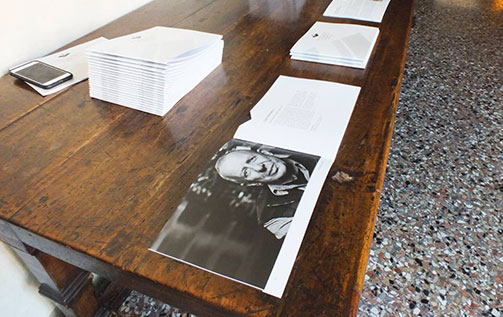
I asked Andrea Alpi, in detail, to whom the course is dedicated.
The Walking through vineyards course is dedicated to the owners and personnel of wine production companies, in particular those who work in marketing, communication and the sales sector; to operators in the quality food and wine trade; to the owners and staff of restaurants and wine bars; those involved in communications, such as journalists, bloggers and people employed in public relations; tourist guides and operators. Walking through vineyards is also aimed at university students on degree courses in wine production and oenology, food and catering sciences and technologies, tourism and cultural heritage sciences.
What are the prerequisites necessary to enrol on the course?
Applicants must have successfully completed an initial course in wine tasting, which is often provided by educational agencies such as the Associazione Italiana Sommelier and many others.
What skills will participants be able to acquire?
The skills that this course provides are linked to the six subject areas that make up the course: we cover highly operational skills, so specialisation with some of the major Italian tasters in the field of sensorial analysis, to skills of an economic order, since we will place specific focus on the wine markets. The wines of Italy and its territories will, of course, be at the centre: we will have a long exploration of the Italian wine districts. In addition, and this is one of the characterising elements, we have reserved as much as a third of the 180 hours of the course to matters or issues that would not be expected on a course dedicated to wine. Indeed, gastronomic culture will be a fundamental part of the course.
What subject areas will be explored during the traditional teacher-led lessons?
This is a course that has wine and the places of wine as the main focus. It will be more than an oenological journey through Italy; we will go walking though Italian vineyards virtually, but also physically, and so the oenological aspect will be the beating heart of the course. However, this will be accompanied by preparatory and in-depth aspects: tasting, knowing, which means also understanding what the territory is. Understanding the territory is a section that will be especially emphasised: from the location of the land to the composition of the soils but also the landscapes and everything that makes Italian wine a cultural aspect.
We have already talked about the areas understanding the territory and vineyards and wines of Italy; in addition to these, we will be covering the gastronomic culture, making use of the professionals and authorities on such matters within the Scientific Committee, starting, of course, with Alberto Capatti, who will also offer a digression on Italian cuisine, identifying the ten capitals that, due to their history and cultural and gastronomic importance, well represent the heritage of Italian cuisine. We will then place the focus on the communication of quality, that is, all those skills required to transfer the added value of these agri-food products to our interlocutors and a focus, already mentioned by Andrea, on the sensorial aspect and evaluation: we are not only talking about sensorial analysis, which will, of course, be an important factor of the training, but also all those skills that must be mastered in order to express a judgement in an accomplished way.
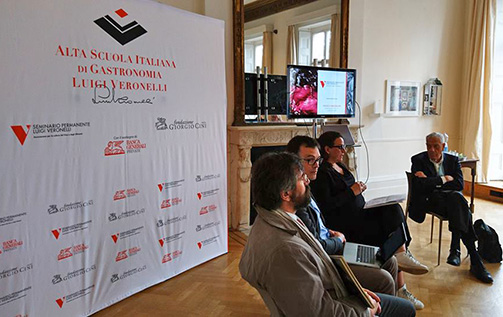
For completeness, I would like to ask Andrea Bonini to list in detail the subject areas that will be explored.
The first specialist course offered by the Alta Scuola Italiana di Gastronomia Luigi Veronelli has a study plan made up of the following subject areas: understanding the territory, vineyards and wines of Italy, gastronomic culture, Italian cuisine, communicating the quality, sensorial aspects and evaluation.
A teaching plan made up in this way fully reflects the multidisciplinary approach that the Alta Scuola wants to offer its students: indeed, we believe that the time of the hyper-specialists is over. Instead, it is necessary to succeed in coordinating different skills to restore the complexity and variety of the Italian wine production sector.
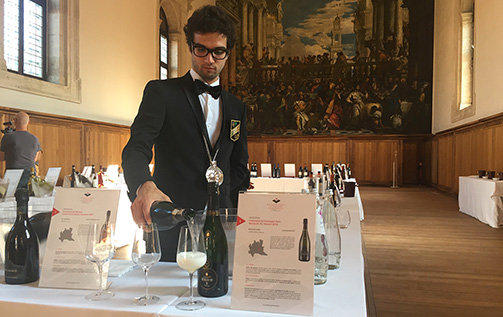
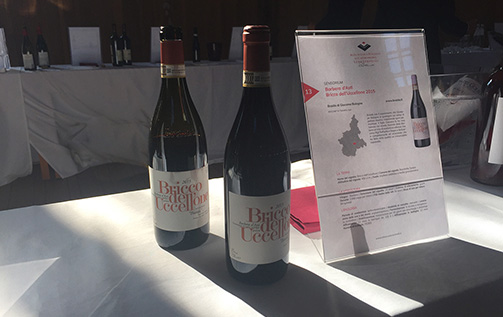
How much time will be given to tasting? Will there be experiential opportunities in the territory?
Tasting is a prerequisite but also a tool. It is a tool of exploration. In each of the 20 lessons that will be dedicated to the Italian wine-growing territories, an hour will be dedicated expressly to tasting, so on-the-spot tasting of wines selected on the basis of the territories explored but also based on the histories, the stories, the slant that the lecturers wish to give to their presentations.
Tasting will also be the subject of a specific course of sensorial analysis: the students’ senses will be developed and raised to a high level of awareness through on-the-spot tastings, not only of wine but also of essences, the actual aromas that can be the key to reading, for example, the main vines of Italy.
Is it possible to take the course without neglecting the professional activity or university studies?
The course has been put together precisely to meet the needs of people who study or work during the year. We have broken down the training into intensive weekends, around one a month during the semester; we then provide an opportunity of concentrated training in a single week in July, residential, as obviously the weekends will be, on the island of San Giorgio, at our base at the Fondazione Giorgio Cini. On that occasion, seven days of lessons will be offered, encounters with the wines, the producers, the experts and the lecturers.
We also have the option of combining the direct, traditional lessons with a part carried out as distance learning through the use of a dedicated platform specifically for this.
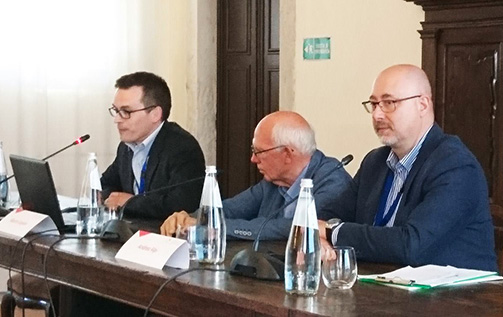
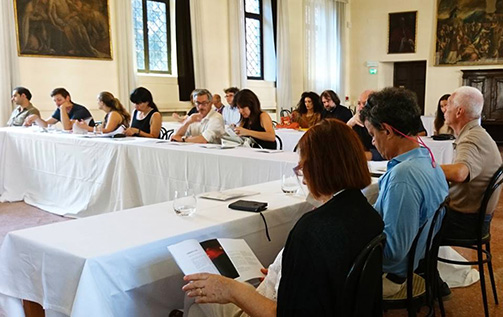
Who makes up the faculty?
For this first course, we have brought together a very large faculty, over 35 lecturers. More than the number, what is striking is the level of quality and the authoritativeness of those lecturers. We have oenologists and agronomists, university lecturers with a specific background in wine production and oenology; we also have figures from the world of culture in order to restore the multidisciplinary approach typical of the Alta Scuola Veronelli and this course.
What role does the Fondazione Giorgio Cini play in this project?
Fondazione Cini is the partner of Seminario Veronelli in this venture and its role is, of course, fundamental, especially for the marvellous location that it is making available, a former Benedictine convent on the island of San Giorgio Maggiore, overlooking the San Marco basin: it is a location that denotes our training activity in a significant way.
But it also has a fundamental role for the skills that it manages to mobilise. When we talk about cultural education, the Fondazione Cini is without doubt an authority and so will be fully involved in the promotion of the training actions.
Among other things, the personnel of the Fondazione Giorgio Cini will assist us and be part of the teaching body in the areas that concern, for example, wine, food and Italian art.
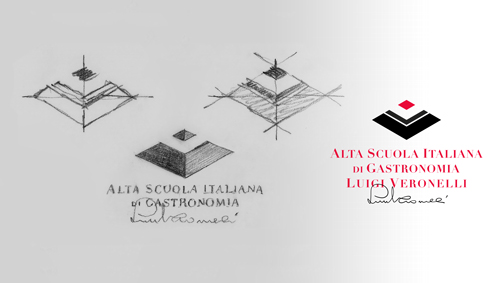
Is it still possible to register?
Registration is still open. On the website of Alta Scuola Veronelli, in the “training” section, it is possible to consult the details about the course, the methods of access, and express interest by compiling a brief written interview.
In what way is this course different from similar training activities?
The approach is what differentiates all the training services of the Alta Scuola Veronelli, the willingness to treat wine and agri-food products as part of a cultural heritage. We will make the maximum use of all the training stimuli available in order to train the students in an active way and involve them to the full.
We will cover the sensorial aspect, we will have on-the-spot examples, we will have a body of lecturers who will bring particular points of view: each one will discuss and describe the territories, the people and the wines with a personal, unique and unrepeatable slant, enriching the course with great fascination and great culture.
The authoritativeness of the lecturers is a distinctive factor of our training course compared to other possible services.
How would you summarise the philosophy that underpins the formulation of this training course?
A difficult question to which I immediately answer with a slogan: gastronomy as culture. Gastronomy cannot be separated from culture; culture enriches this vision, especially for those who want to fully learn it, communicate it and master it.
A prerequisite of the Alta Scuola is that of creating an alternative to gastronomy as entertainment, which seems to be the only dimension linked to food and wine in our historical period. We believe that the operators above all must acknowledge their role as active subjects from the cultural point of view and become promoters of a heritage that is immense and that we believe to be still undervalued.
Among the images: logo and coordinated image, invitations, brochures and site created by SGA.
Tag Cultural products, Gastronomy, Global design, Interview, Oenology


